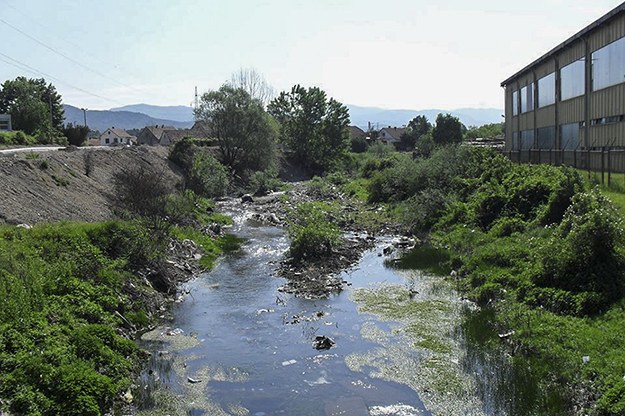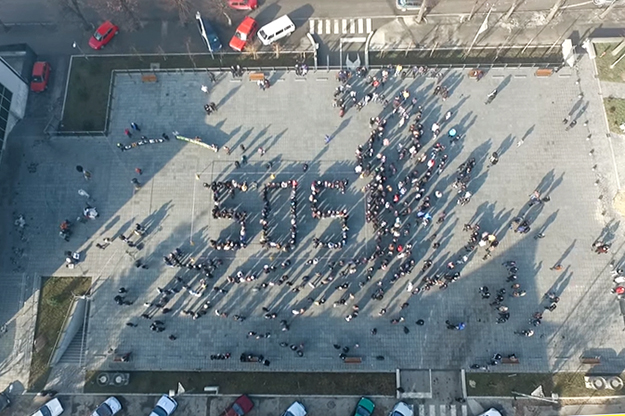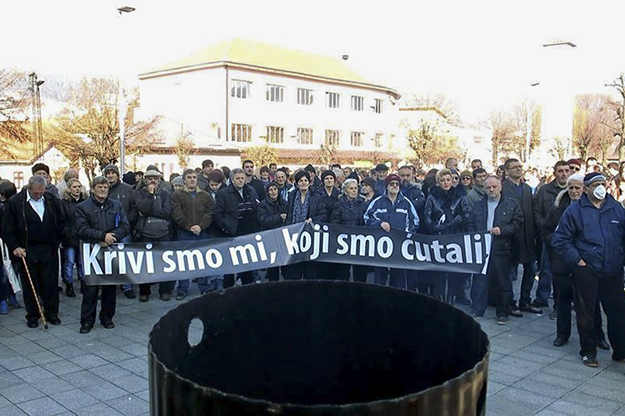Montenegro is the only Balkan country to legally declare itself as an ‘ecological state,’ but the reality it finds itself in denies this commitment. Environmental activists are unsatisfied by the state’s attitude towards Montenegro’s nature, claiming that the water and land are being contaminated uncontrollably on a daily basis, though add that citizens share the responsibility for this with the state.
According to early estimates, as a candidate state for entering the European Union Montenegro will have to spend more than 1.35 billion euros on ecology in order to reach EU standards on wastewater treatment, waste management, and air quality improvement.
Ecological state in name only
In 1991, the Montenegrin authorities adopted a declaration by which the country became the first ecological state in the world. This status was confirmed by the Constitution 16 years later, which is when the country’s developmental path was defined. In the first article of this highest legal act, it is clearly stated that besides being a “civil,” and “democratic,” state, not to mention one of “social justice based on the rule of law,” it is also an “ecological” state.

The only ‘ecological state’ in the Balkans is covered with illegal landfills. Photo courtesy of the ‘Ozon’ eco movement.
The naked eye can see that the idea of an ecological state has not been well realized. Illegal landfills, uncontrolled woodcutting, devastation of areas and contamination of riverbeds are commonly spotted scenes around the country.
Despite the repeated platitudes about environmental protection from the authorities, annual reports by the European Commission show that insufficient measures have been undertaken in the area. In the last report, dating back to November 2016, it is mentioned that Montenegro, as a future European Union member-state, has to invest additional efforts in this field. The Commission suggests in its report that special focus needs to be placed on the sectors of water treatment, environmental protection, and waste management, and that the state needs to better implement its existing legislature in these areas.
Although the laws that should guarantee a responsible stance towards natural resources and the environment are largely in accordance with EU legislation and directives, they are not very well implemented in practice, which institutions justify by pointing to insufficient administrative capacities and a lack of inspection bodies. The European Commission had previously warned Montenegrin authorities about this issue, and suggested that an additional problem is the lack of professionals at both national and local level.
“Satisfactory” conditions
It seems that officials in the Montenegrin Government haven’t read the same European Commission documents. For them, the condition of the Montenegrin environment is “satisfactory,” while the Ministry of Sustainable Development and Tourism is especially proud of the fact that Montenegro is best ranked of all EU candidate states.
Ivana Vojinovic, the head of the Environmental Directorate within the Ministry of Sustainable Development and Tourism recently told the press that: “The environmental condition in Montenegro is satisfactory, and this is an evaluation obtained through a state-run monitoring program of all environmental segments which we apply every year.”
Activists, civil society representatives and citizens, don’t hide their dissatisfaction at this state of affairs. The head of the ‘Ozon’ ecological movement Aleksandar Perovic, believes that, instead of feeling the benefits from proper management of natural resources, Montenegrin society is starting to pay for the consequences of wrong policies and decisions.

Civil society is trying hard to draw public attention to ecological issues in Montenegro. Photo courtesy of the ‘Ozon’ eco movement.
“There hasn’t been a proper branding of the ecological state, which was the first serious step, so we must doubt that there was ever a serious intent from decision-makers at the top levels to work on this unique but complex project,” Perovic told K2.0. “As for us, the citizens, we can only regret that — during the struggle for bare survival — we have allowed the devastation of areas and environmental degradation: uncontrollable exploitation of natural resources such as minerals, forests and river materials, unlawful hunting, and many other issues that have brought about permanent environmental and economic consequences.”
Contamination of rivers and forests is visible, and a trend of increased air pollution is clear. The NGO sector claims that this is the best proof of how much decision-makers have taken care of the quality of the environment.
“There isn’t a single riverbed without a variety of disposed waste, where river ecosystems aren’t endangered — some are completely destroyed,” Perovic stated. “There isn’t a single mountain without illegal and purposeless woodcutting. Both river and forest ecosystems are threatened by unlawful hunting. Water, land, and air are being polluted daily, and this is difficult to halt, because besides the arrogant attitude of industrial polluters, and, unfortunately, individual habits of citizens are also threatening the environment.”
The air quality in many Montenegrin municipalities is also at an unacceptable level. According to European Environment Agency estimates, in 2011 in Montenegro there were 513 prematurely deceased persons due to exposure to suspended particles in the ozone. Milorad Mitrovic from the “Breznica” NGO based in Pljevlja, the most polluted municipality in both Montenegro and all of Europe, points to the fact that citizens are breathing in air which is damaging to their health.
“The worst thing is that the toxic substances even influence the unborn children, because the mother transmits toxic matter to the embryo by breathing the air,” Mitrovic clarifies. “This way, the child is exposed to a higher risk of being born with heart issues.” Pljevlja leads the country in terms of negative population growth.
Another problem at the local and state level is visible in the field of waste management. Currently, there are 2 regional landfills in Montenegro, in Podgorica and Bar, and their capacities are being consumed faster than planned. Environmentalists have identified over 350 ‘wild landfills,’ areas where waste is consistently disposed despite not being the designated site, across the country.
Citizens as collateral damage
Pljevlja is not only a leader in pollution and exceeding concentrations of particle materials, but, as Mitrovic emphasized, the municipality is also breaking records when it comes to the number of visits paid to the Health Center and General Hospital. According to Mitrovic, there are 4,000 patients visiting their doctors daily.

Instead of educating citizens on ecology, priorities in Montenegro are given to day-to-day topics. Photo courtesy of the ‘Ozon’ eco movement.
“Decision-makers and polluters have their mouth full of European integration, upholding standards and regulations in the field of environmental protection,” said Mitrovic, adding that the genuine obligations, which have to be implemented by law, aren’t enacted by anyone, while citizens of Pljevlja are poisoned, they suffer, remain quiet and die.
Mitrovic identifies the citizens of Pljevlja as the “collateral damage of the ‘dynamic’ progress of Montenegro and its unstoppable path towards the European family.”
Perovic points out that even for most EU members the implementation of the Union’s standards is not simple, but that for Montenegro, especially due to its constitutional determination and its size, this process needs to be more successful and visible.
It is now certain that opening this negotiating chapter will cost Montenegro a lot of money, effort, and time. The state doesn’t have this money. It is unlikely to be secured in a situation in which, due to a lack of resources in the state budget, new austerity measures are imposed, such as abolition and reduction of certain social benefits, an increase on VAT, and the reduction of salaries in the public sector.
Perovic has identified a number of shortcomings in the financial estimates. “I believe this number to be significantly larger, since everyday new costs are created,” he said. “Unfortunately, the state institutions didn’t think it to be important to invest in ecological education, which is of essential importance if we want the investments made in the environment to pay off and to be sustainable.”
Perovic believes that there isn’t a single reason for citizens to be satisfied with the attitudes of decision-makers in terms of the environment, and that the government and parliament are equally guilty for disastrous policies and decades of degradation to natural resources. According to him, instead of being led by a vision of an ecological state, as the most promising developmental opportunity for the Montenegrin society, priority was given to day-to-day politics and short termist solutions.
He criticises all three branches of government, highlighting that it is especially worrying that the judiciary is deaf before the obvious law-breaking on behalf of the biggest industrial polluters, some of which didn’t even have a use permit, let alone an ecological consent or other necessary permits.
Feature image courtesy of the ‘Ozon’ eco movement, Montenegro.




